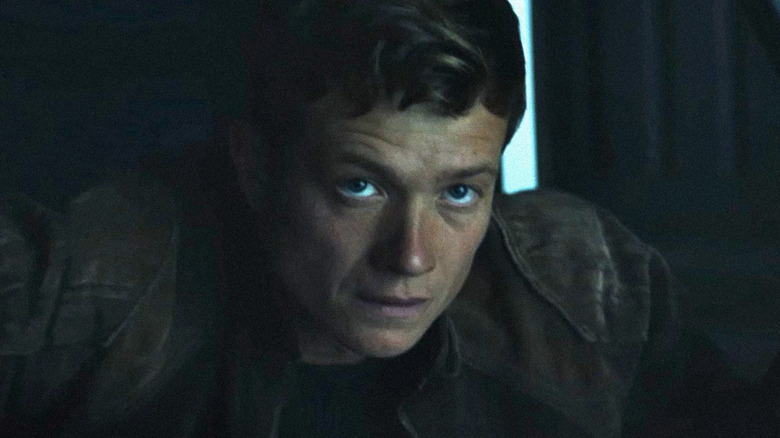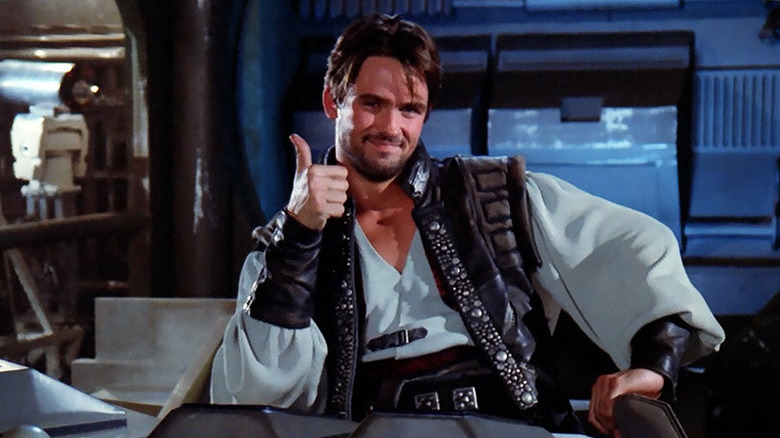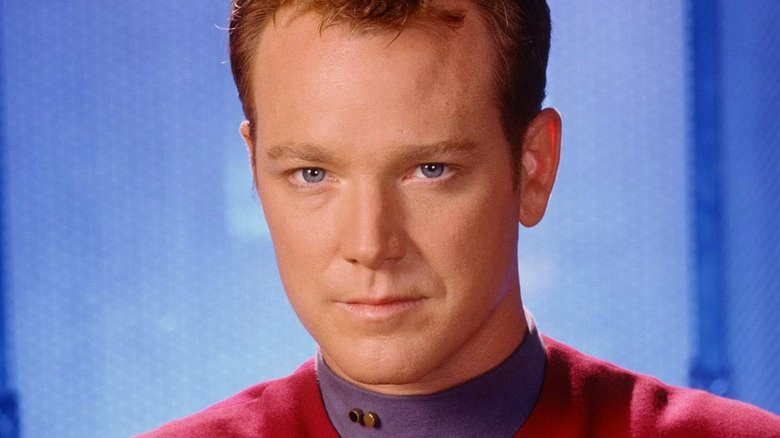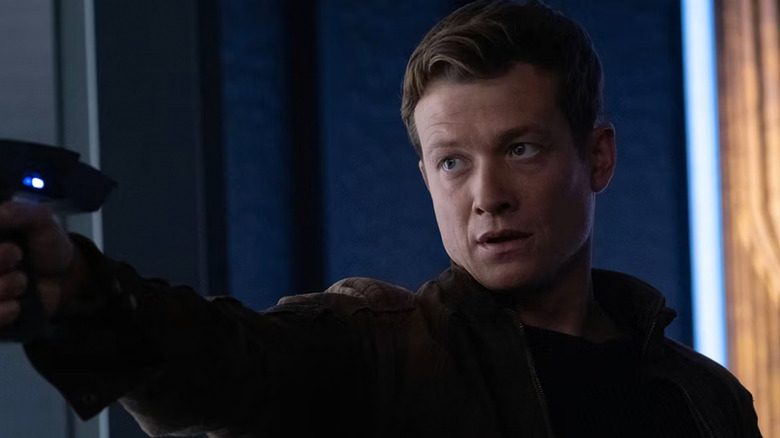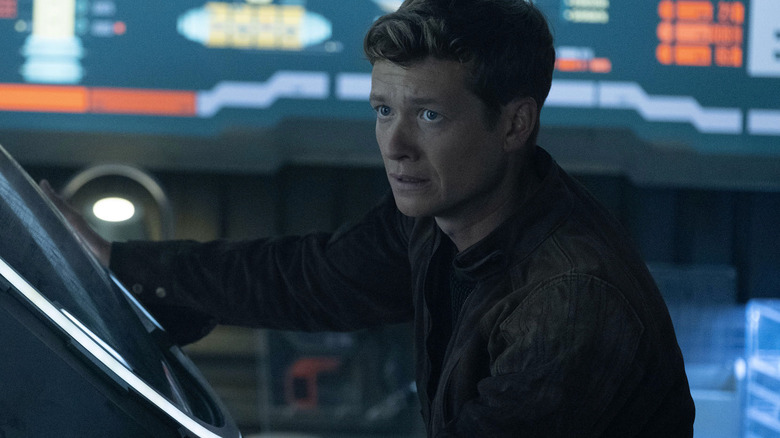After Decades Of Failed Attempts, Star Trek: Picard Season 3 Finally Gives Star Trek Its Han Solo
This post contains spoilers for the second episode of "Star Trek: Picard" season 3.
Science fiction, like so many well-hewn genres, is nothing without a few archetypes to lean back on. There's of course, the chosen one, the grizzled guardian, and the elusive soldier of fortune. The latter is probably the most difficult to get right, even after "Star Wars" pretty much created the perfect template for the type with Harrison Ford's Han Solo. There's a lot going on in a character like this: not just latent sex appeal, but a reckless competence and hard-earned skill in battle. Hubris too, and a sense of self-preservation. It's a difficult cocktail to get right, and it's why so many sci-fi properties routinely fail to recreate that magic themselves.
"Star Trek" is one such property that's made an attempt — actually, a series of attempts — at recreating Han Solo's popularity. If we're being 100% honest with ourselves though, the concept of a space rogue just doesn't play well within the parameters of Gene Roddenberry's utopia. The United Federation of Planets is a system in which everyone is pretty much supposed to live in harmony. That world can't exist without Starfleet, and with Starfleet comes rules, regulations, and a rigid chain of command. It doesn't really favor individualism, especially not individuals who openly flout the rules and skirt through life on their charm. Obviously, this isn't all bad: think of all the good Starfleet's done with a capable pilot on their side. But for each of our swaggering hopefuls, to join Starfleet is to kiss your character-defining quirks goodbye in service to the Federation ... that, or spectacularly crash and burn.
The outrageous Okona
Take Captain Thadiun Okona (Billy Campbell), the franchise's more obvious attempt to bring a space rogue into the fold (however briefly). Okona is the center of a one-off "Next Generation" episode, "The Outrageous Okona," and he's got everything one might expect of a swashbuckling himbo in space, down to his billowy v-neck and shockingly high sex drive. But sadly — or maybe hilariously — Okona is more a defanged version of the archetype and one of the biggest examples of the franchise's failure.
Okona's not an easy guy to trust right off the bat: the Enterprise crew encounters him drifting through space in a busted ship, and once they bring him aboard, he makes quick work of charming the pants off every Starfleet member he sees. Because of this, no one is all that shocked when his past exploits manifest some real consequences ... or plant the Enterprise crew in the crosshairs of a gnarly interplanetary conflict.
Okona is accused of knocking up a young woman from the planet Altec, and of stealing a priceless national treasure from the planet Straleb. At first, these accusations seem right in line with the kind of character Okona seems to be (or, at the very least, is trying to be). But "Next Gen" veers away from overtly familiar characterization — and, sadly, a story that actually could have been interesting — by absolving Okona of both crimes. It turns out that he's actually just a really nice guy deep down, a guy that believes in true love and would never steal anything of his own volition. There's a chance the writers wanted to subvert the archetype in their own clever way — but that subversion really demonstrates why a character like Han Solo just doesn't work in the world of "Trek."
Enter Tom Paris
Of course, that doesn't mean "Star Trek" writers wouldn't keep trying. The slightly more mature tone in "Star Trek: Voyager" made room for characters like Tom Paris (Robert Duncan McNeill). His characterization in the "Voyager" double-pilot, "Caretaker," started off strong: unlike Okona, Paris checked nearly every box in the space rogue criteria. He's a convicted criminal turned jaded free agent, and every statement he makes is some variation of "What's in it for me?" He's got zero allegiance to Starfleet — partially to spite his dad, a decorated admiral — and he reeks of wounded cynicism.
As most "Voyager" fans already know though, Paris is gradually reformed as the series goes on — and it doesn't take long for his homegrown Federation training to take over. Paris' arc on "Voyager" is all about rehabilitation and, in a way, assimilation. When he first joins Captain Janeway (Kate Mulgrew) as an observer — and later a de facto crew member — aboard the U.S.S. Voyager, established crew members know to steer clear of him right off the bat. If this were any other franchise, Paris would lean into his reputation with a bit of overzealous bravado. But from the very beginning, we can see how much his checkered past weighs on his conscience, and how determined he is to challenge the assumptions of his character. By the time "Voyager" came to a close, Paris had shed so much of his prickly persona that only his sarcastic wit and irresistible charm remained. It's heartwarming stuff, watching Paris learn to become an upstanding member of society — but again, it's not exactly the brief.
And finally: Jack Crusher
That brings us to the third season of "Star Trek: Picard," and the introduction of Jack Crusher (Ed Speleers). It's difficult to ignore the elephant in the room when it comes to Jack — the elephant being his estranged dad, Jean-Luc Picard (Patrick Stewart) — but fortunately that's not the only interesting thing about this new character. Jack is also just about the closest that "Star Trek" has come to recreating Han Solo within their universe. Not only is he a conman with multiple aliases in circulation, but he's broken a ton of laws — and not just the laws holding the Federation together. He's accused of organized crime, terrorism, murder — but to hear Jack himself tell it, it's all been in the service of bringing medical aid to wartorn planets outside of the Federation.
Ironically, Jack is much more altruistic than your typical rogue. He does not need to be coaxed into lending a hand where he's needed, no matter how dangerous or illegal. In fact, he seems to relish the act of diving headfirst into a warzone. That has a lot to do with his mother, Beverly Crusher (Gates McFadden), who clearly showed him how fulfilling it can be to fight for the less fortunate. The red tape of the Federation's many rules and regulations clearly keeps him from being where he needs to be; saving the lives he feels he has to save. But there's a recklessness to Jack that suggests he's also doing it for the thrill. That connects him both to the archetype and to Picard in a really clever way.
What went right
So why does Jack Crusher succeed where every other attempt has failed? Not to beat a dead horse, but it really does go back to the limits of Federation space. The world of "Trek" has always been described as a utopia, but grittier series have worked to subvert, challenge, and unpack the truth of that statement. Perhaps more than any series before it, "Picard" revealed that the 24th century really isn't a utopia at all. The Federation makes mistakes, it covers things up and turns a blind eye to tragedy all over the galaxy. It's not perfect by any means, especially not for everyday people.
For a long time though, the world of "Trek" was a bit too in love with the concept of its own goodness. Aside from a few hiccups, the system was without flaws, so there was no real reason to operate outside of it. It's why characters with Jack's same qualities have either been written off — see "Picard" regular Cristobal Rios (Santiago Cabrera) — or reformed by Starfleet. It wasn't until nu-"Trek" peeled back that facade, uncovering the rot underneath, that it made sense for an anti-establishment type to exist.
Jack and Beverly's crusade reveals how the "natural order" can harm just as much as it helps. They break the rules like any rogue — but not to serve themselves. To serve others. Their ethos echoes exactly what Starfleet's meant to stand for, and if done right, it could be exactly the shock to the system that the Federation — and its favorite Admiral, Picard — really need.
"Star Trek: Picard" airs new episodes Thursdays on Paramount+.
